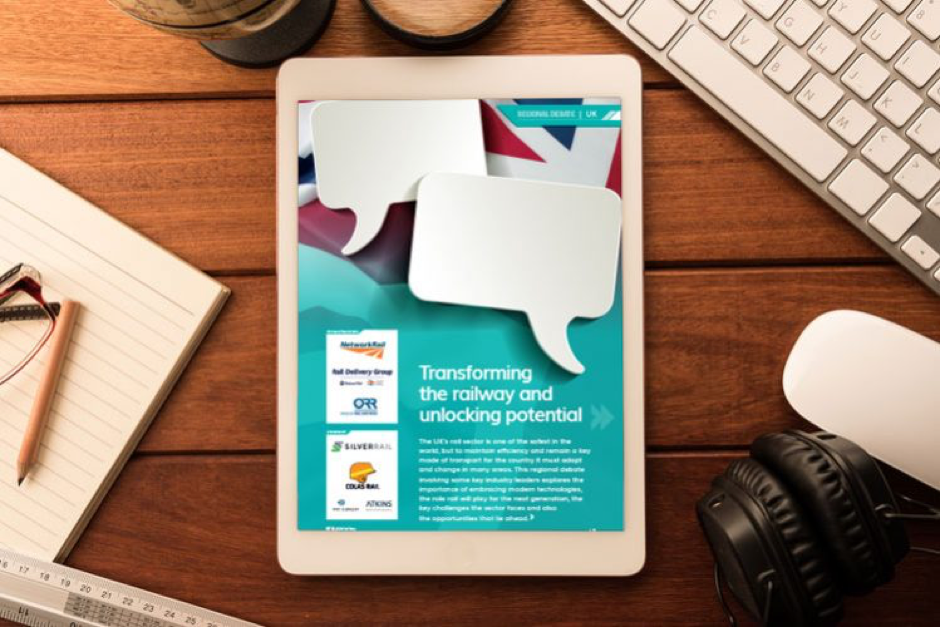REGIONAL DEBATE – UK
19/06/2018
Written by Frederic Kalinke
Transforming the railway and unlocking potential
The UK’s rail sector is one of the safest in the world, but to maintain efficiency and remain a key mode of transport for the country it must adapt and change in many areas. The regional debate, by Global Rail Review, involving key industry leaders explores the importance of embracing modern technologies, the role rail will play for the next generation, the key challenges the sector faces and also the opportunities that lie ahead.
With the participation of:
- MARK CARNE
Chief Executive, Network Rail - PAUL PLUMMER
Chief Executive, Rail Delivery Group (RDG) - JOANNA WHITTINGTON
Chief Executive Officer, Office of Rail and Road (ORR) - DAVID PITT
Head of UK, SilverRail - JAMES QUINNELL
Chief Commercial Officer, Colas Rail Ltd
Here, we give you a snapshot of the insights shared from David Pitt, Head of UK at SilverRail.
Rail is entering the digital age. How will technology and new ‘intelligent’ solutions impact the performance of the UK’s rail sector, and how will the industry need to adapt to embrace change?
“Rail is effectively a retail service and like any other retail experience, customers want good information; assurance that they are buying something of value and quality; and for the service to be fulfilled as efficiently and easily as possible. The way in which UK rail currently operates is almost at a tipping point and technology and pricing are two key factors. Customers are struggling to pay for rail travel; and this will soon become an issue for the government and rail operating companies. Eighty per cent of rail tickets in the UK are still purchased offline, which, in 2018 with the continuous growth of online retailing, is somewhat indicative of the problem. When compared to online grocery shopping, for example, the channel shift to online and mobile for rail remains a struggle.
Although online ticket purchasing is available, in many cases the customer must still collect a ticket at the station – either at the ticket office or from a ticket vending machine. Whilst we are now seeing the general rollout of digital fulfilment to barcode on smartphones and smartcards, it will take some time for the orange ticket to become redundant unless the customer’s retailing experience becomes easier. Unfortunately, with a rather confused approach to rolling out digital ticketing over the last few years, this has only compounded the problem with no single fully interoperable solution being promoted centrally, which the train operating companies could then get behind.
Looking ahead, we’re investigating how the physical ticket can be removed, and how digital technology can be used to hide the complexity of ticketing media, operators and product offers into a single mobile app. After all, the concept of a ‘ticket’ is for the benefit of the train company, not the customer. With the right kind of relationship between the train company and the customer, supported with suitable technology, the customer could have a continuous right to travel and simply settle up at the end of the day. The concept of buying a ticket in advance will always have its place with longer, more expensive journeys, but on the average daily commute when costs, etc. are generally understood by the customer, they probably value flexibility alongside value pricing. In fact, with modern working habits the customer needs flexibility – the ability to turn up at any station, get on a train without knowing the timetable and be charged for the journey they make. This is what we should be aiming for and over the next 18 months I believe that we will start to see account-based ticketing (ABT) with both pre-pay and post-pay options introduced.
Chiltern Railways is already trialling an ABT system, which works in a similar way to the Oyster card in London; automatically calculating the best value fare for a national rail journey, andgiving travellers real-time information. Within the next three to five years this will likely become normal. ABT doesn’t mean we have to do away with pre-paid tickets, but they won’t be the only option and as a result the customer should start to see much more flexibility in their retailing and travel experience. Minor changes to industry rules could see this same digital technology easily deliver flexible season tickets together with a daily, weekly, monthly and annual price promise across the UK rail network, encouraging us all to make better use of trains.”
Rail faces growing competition from other modes of public transport, so what can the UK rail sector do to ensure it retains a large share of the transportation market?
“It’s not just about competing with other modes of public transport, but competing with private-use cars, autonomous vehicles and even video conferencing; do we really need to travel at all? There are many different mini revolutions happening at the moment.
Obviously, the smartphone has changed the landscape for many industries over the last 10 years and we may well be facing a similar revolution in the 2020s with self-driving cars and, subject to legislation, the wider (positive) sharing of data to enhance services and experience. All too often we hear and see the headlines about data being shared without our knowledge, but data-sharing (if managed properly) will enable multiple services to be delivered to us seamlessly. A good example of this is a rail journey. We don’t board the train at our front door, its typically part of a multi-step and multi-modal journey, which normally requires a number of tickets from different suppliers. In the future, rail providers must embed themselves in the middle of the door-to-door journey, which will require different service providers coming together for the benefit of the customer. This can only be a good thing helping both the railways and the wider economy. If done right, people will always want to travel by rail. It’s only when the barriers to entry for rail travel become too great – such as price, poor information and ticket-related stresses – that people choose not to travel.
Rail companies must always consider the customer experience, and this is where the greatest challenge will be. If rail doesn’t step up and do things better, there are others out there who are more accustomed to providing an excellent digital and customer experience that can, and will, move in to satisfy the customer’s needs.”




